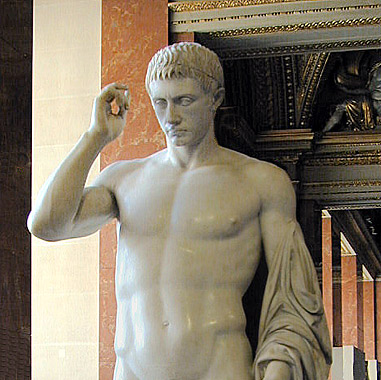
|
|
The only son of Gaius Claudius Marcellus and Octavia, the sister of
Augustus, the younger
Marcellus was more noted for his relationship to
the Emperor Augustus and his early death than for any accomplishments of his
own. The young Marcellus was named after an ancestor who was consul in 222 BCE
(memorialized on a
coin of 50 BCE) and highly
acclaimed for his military victories against the Gauls and the Carthaginians.
After the younger Marcellus fought bravely in Spain in 25 BCE under Augustus'
command, the princeps gave his nephew his daughter Julia in marriage and
arranged his swift advancement in the
cursus honorum. As curule aedile in 23, the
year of his death, Marcellus arranged lavish games that won him great
popularity.
His death in the Roman summer resort at
Baiae in Campania before his 20th year was mourned
by his family and the Roman people. His memory is preserved both in stone and
in verse. An equestrian statue of an aristocratic youth who bears a resemblance
to Augustus' descendents is thought to be
Marcellus. A larger-than-life size
marble
statue of Marcellus, sculpted by
Cleomenes the Athenian in the heroic Greek style, was commissioned by Augustus
in 20 BCE. Augustus had his grandson buried in the family
mausoleum, where the names of his parents,
Marcellus (GENER) and Octavia (SOROR), survive in an
inscription (photo credit: J.
Higginbotham). Augustus built and dedicated this graceful theater to him
posthumously, while his sister Octavia named a library after her son.
Two
poets of the Augustan age commemorated the loss of this promising young hero.
Most famously, the epic poet Vergil memorialized him in
Aeneid VI. 868-886, in verse Suetonius
reports in his Vita Vergili was so moving that Octavia
fainted as she and her brother listened to the poet read aloud this section of
his work (here is one of several later paintings of this
scene). The elegiac love poet
Propertius laments Rome's terrible loss in
Elegy III.18.